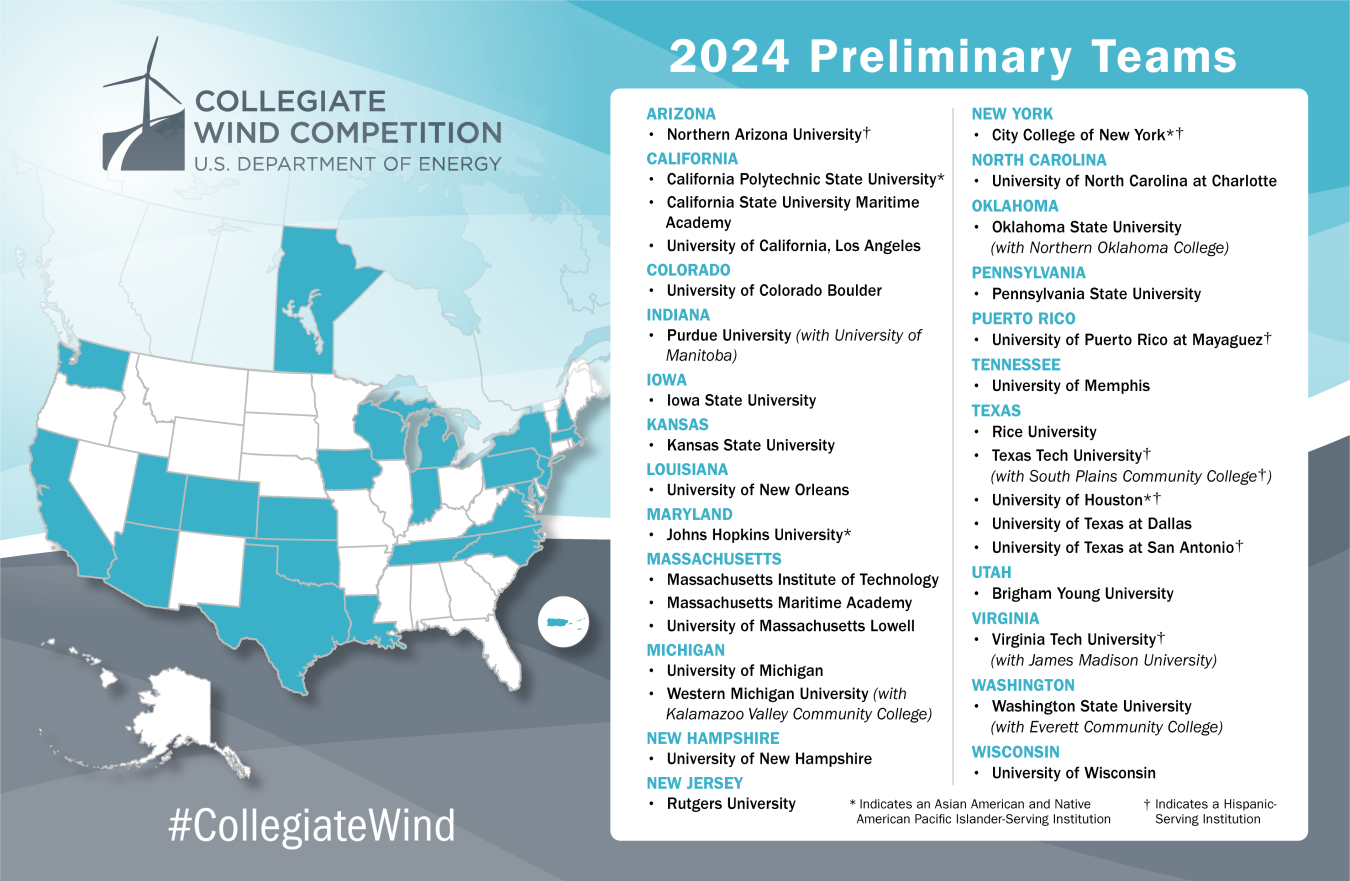WASHINGTON, D.C. — California State University Maritime Academy is one of only three universities representing the state of California in the 2024 Collegiate Wind Competition (CWC).
The U.S. Department of Energy (DOE) recently announced the 32 college and university teams selected to participate in the CWC during the first half of the 2023–2024 school year, with Cal Maritime and California Polytechnic State University (Cal Poly) being the only two campuses from the California State University (CSU) system represented.
The CWC, which first launched in 2014, helps prepare the future wind energy workforce by inviting college students from a range of disciplines to represent their schools as they design, build, and test a prototype wind turbine; develop a site plan and cost-of-energy analysis for a hypothetical wind farm; and conduct outreach with the wind energy industry, their communities, and local media outlets.
The 2024 CWC will focus on siting, outreach, and development challenges associated with fixed-bottom offshore wind energy projects. During the first half of the upcoming school year (September 2023–January 2024), teams will develop a preliminary design and report for their prototype wind turbine and a preliminary site design for their hypothetical offshore wind farm. The teams will also create an outreach strategy which may include, for example, interviewing professionals from different wind industry sectors to learn about career opportunities and/or creating outreach materials to educate and inspire younger students.
The first round of teams will receive $2,000 in funding, which they can use to begin designing their prototype wind turbines, creating their wind energy project development plans, and developing their outreach strategies.
The first round of college and university teams selected to participate in the 2024 Collegiate Wind Competition are:
- Brigham Young University
- California Polytechnic State University
- California State University Maritime Academy
- City College of New York
- Iowa State University
- Johns Hopkins University
- Kansas State University
- Massachusetts Institute of Technology
- Massachusetts Maritime Academy
- Northern Arizona University
- Oklahoma State University with Northern Oklahoma College
- Pennsylvania State University
- Purdue University with University of Manitoba
- Rice University
- Rutgers University
- Texas Tech University with South Plains Community College
- University of California, Los Angeles
- University of Colorado Boulder
- University of Houston
- University of Massachusetts Lowell
- University of Memphis
- University of Michigan
- University of New Hampshire
- University of New Orleans
- University of North Carolina at Charlotte
- University of Puerto Rico at Mayagüez
- University of Texas at Dallas
- University of Texas at San Antonio
- University of Wisconsin
- Virginia Tech University with James Madison University
- Washington State University with Everett Community College
- Western Michigan University with Kalamazoo Valley Community College.

Graphic from Al Hicks, National Renewable Energy Laboratory.
Among the first round of CWC 2024 teams are three community colleges and one institution based in Canada. In addition, 10 minority-serving institutions are participating in this first round, including five Hispanic-serving institutions, three Asian American and Native American Pacific Islander-serving institutions, and two schools that fall under both of those designations.
By early 2024, the competition organizers will use a performance-based selection process to narrow the competition to, at most, 12 final teams. These finalist teams will be invited to continue to participate in the CWC during the second half of the school year (January–May 2024) and will be awarded $15,000 to complete their projects, which includes building their prototype wind turbine. The finalist teams will also be invited to test their prototype turbine in an onsite wind tunnel and present their work at the CWC final event, where they will be eligible for prize funding from a $30,000 prize pool. Teams not selected as finalists will be invited to continue as learn-along teams, which offers teams the option to participate in remaining CWC activities and attend the final event for the purpose of deepening their knowledge of wind energy.
The CWC is funded by DOE’s Wind Energy Technologies Office and managed by the National Renewable Energy Laboratory.
ABOUT CAL MARITIME
Established in 1929, California State University Maritime Academy is the only degree-granting
maritime academy on the West Coast. Located in Vallejo, California, the campus offers
undergraduate degrees that prepare students for careers in engineering, transportation,
international relations, business, and global logistics. Cal Maritime also offers
a master’s degree in Transportation and Engineering Management, as well as a number
of extended learning programs and courses.
